Claude Forthomme's Blog, page 38
October 17, 2013
The Globalization of Indifference: Who Cares About the Poor and Hungry?

We waste one third of the food we produce and 842 million people, that's one person in every eight human beings, go to bed hungry every night. One in four children are stunted by malnutrition while almost 500 million people are obese (see this spot video).
That's the kind of world we live in.
Yesterday, on the occasion of World Food Day, celebrated here in Rome at the headquarters of FAO, a United Nations specialized agency dedicated to food and agriculture, Pope Francis had these magnificent words to stigmatize our culture of waste and the lack of solidarity: "the globalization of indifference".
To waste food is like stealing from the poor, he said, and "homeless people dying on our streets is no longer news" (see the UK Telegraph's report on the Pope's address here). And you can visit the Pope's Facebook page here (and like it, I did!)
As he put it, we slowly "grow used to the suffering of the other, as if it were normal" (italics added).
It's not normal. And it's about time we did something about this, all of us, in our personal lives. And that our politicians woke up to the problem.
The Italian Minister of Agriculture, Nunzia de Girolamo, who attended the World Food Day meeting yesterday noted that Italy had 400,000 persons suffering from hunger and that €5 million Euros had been set aside for them in the new economic "stability law". Sounds good. But this contrasts with the € 61 billion destined in the same law to the military expenditures of the Italian Ministry of Defense (that include 130 fighter-bomber planes).
Speaking of guns vs. butter, that's a lot of guns and very little butter!
Don't you agree?
Related articles
 UN Warns Against Food Waste on World Food Day(medindia.net)
UN Warns Against Food Waste on World Food Day(medindia.net) Ending hunger is possible says UN(skynews.com.au)
Ending hunger is possible says UN(skynews.com.au) VATICAN - FAO - Pope: hunger, "a scandal" caused by slavery of individualism and profit at all costs(asianews.it)
VATICAN - FAO - Pope: hunger, "a scandal" caused by slavery of individualism and profit at all costs(asianews.it)









Published on October 17, 2013 02:25
October 16, 2013
Angkor Wat: An Announced Disaster

One of the major architectural gems in the world, Angkor Wat, a UNESCO World Heritage site, is falling apart.
A recent documentary aired on ARTE rang the alarm (you can see it here, "Angkor Redécouvert", in French - if your country allows it, here in Italy, it can't be streamed, a real pity).
Time is running out on the Khmer temples. Even the "better preserved" ones are threatened with collapse:

(Photo by Bill Pfeffer, see here)
One speaks of "best preserved" in the sense that, unlike other temples, they retain most of their statues: during the civil war and Khmer Rouge control of the country in the 1970s and 1980s, the temples were stripped bare and statues routinely stolen and sold abroad.
Wikipedia will tell you that little damage was done to the temples in the course of that dark period, but this is not true at all. The stolen art was not some unimportant "post-Angkorian statues". Indeed, many were the real thing, as beautiful as the ones that French 19th century explorer Louis Delaporte brought back to France and that can now be seen at the Musée Guimet in Paris, like this one:

Khmer Art at the Guimet; Vishnu God, 12th century
Recently the Musée Guimet has rediscovered in one of its warehouses the casts Delaporte had commissioned of statues and other Angkor Wat artwork. An exhibition showing them opens on 16 October and for the first time we are able to see them since the Indochina Museum in the Trocadero closed in 1936 (for more info, click here).
In fact, Delaporte was not only an archeologist but also an artist, capable of a perfect rendering of the majesty and beauty of Khmer artwork, as, for example in this engraving of Khmer statues shown in 1878 at the Exposition Universelle held in Paris:
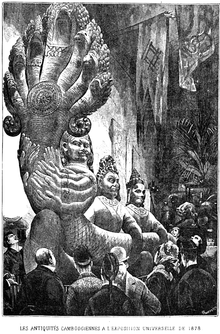
I love the way he shows the crowd's surprise and interest in the statues. Also note the dramatic size of the statues compared to the people around them.
If it weren't for the hard work and dedication of someone like Louis Delaporte, we would have no idea today of the real beauty of Angkor Wat. Wondering what the man looked like? Here he is:

He doesn't look too happy, does he? No doubt because he had a hard time getting people interested in the Khmer art he'd brought back. The Louvre refused to house it and he ended up creating his own museum in the Trocadero Palace. It was only after he died that the artwork was finally sent to the Musée Guimet.
It is odd that it has taken so long for everyone to realize the importance of Khmer art...And now Angkor Wat is collapsing, once again in the general indifference of the public. How sad.
If you're in Paris, make sure you don't miss that exhibition of Delaporte's casts at the Guimet, it's called "Birth of a Myth. Louis Delaporte and Cambodia”. Let me know what you think. What can be done to save Angkor Wat? Any suggestions? But please spread the word, the more people hear about this, the better chance for the temples to be saved...
Related articles
 Angkor casts out of hiding(ttrweekly.com)
Angkor casts out of hiding(ttrweekly.com) Temple Time! (Part I)(dianebushman.wordpress.com)
Temple Time! (Part I)(dianebushman.wordpress.com)









Published on October 16, 2013 00:53
October 15, 2013
A Literally Dreadful Idea: the Death Watch! And What Google Plans to Do About Aging

The idea is dreadful in the original sense of causing dread: a Death Watch is nothing but plain scary. But, philosophically speaking, it helps you realize that your life has a definite time span and that you ought to plan every minute for maximum enjoyment and fulfillment.
See here the article in the Daily Express about the invention of a Swede, inspired by his grandfather's death.
Amazing.
The Life Watch of my soon-to-be published science fiction novel, Forever Young, has become a Death Watch in reality!
Can it predict when you'll die? No. Though my fictional Life Watch can... that's because it's an innovation set in the future, about 100 years from now. That's the advantage of fiction over reality!
Can it ever come to pass? With Google's help, maybe...

Yes, it's no joke. While Big Pharma has temporarily given up on searching for a long-life pill, Google is investigating death and aging: that is what its co-founder Larry Page, age 40, has just announced on his Google Plus page (see here).
The new company, called Calico is headed by Art Levinson, Chairman and former CEO of Genentech and current Chairman of Apple. The project is certainly far from Google's core internet business and is meant to "tackle aging and illness", as Larry put it.
The announcement has instantly created waves on the Net. Time dubbed it "Google's new project to solve death" by "dramatically extending life" (see article here):
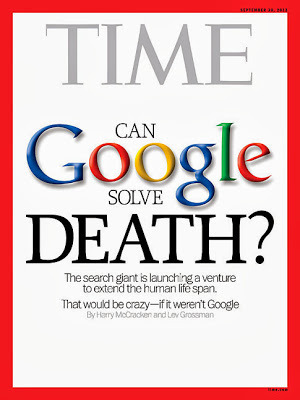
Forbes.com called it "infinity and the search for longevity"(here), Tech Crunch had strong words: "WTF is Calico" and why does Google think "it can defy aging" (here), and in Italy they talk smoothly about Google's "elixir against old age" (here).
It looks like death and aging have become quite popular topics!
That certainly should come as no surprise given the dramatic aging of the world population over the next decades.
What's your take? Should we all turn morbid and count the days, hours, minutes and seconds till we die or try and do something about it? I rather prefer Google's approach...
(source of photo: The Tikker Watch, www.theregister.co.uk ; Larry Page via http://www.crunchbase.com/)










Published on October 15, 2013 02:16
October 14, 2013
Silicon Valley Rattled by Dave Eggers' New Book - A Quick Review of "The Circle"
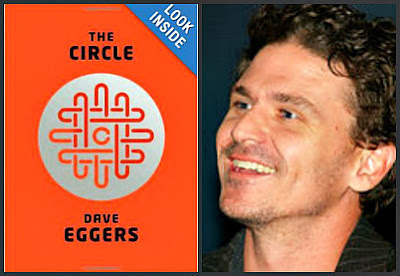
Dave Eggers, a wildly popular author and education activist, has come out with a new novel about the techie world of Internet, called The Circle . It has rocked Silicon Valley and won both high praise and furious criticism.
The Internet titans, Google, Facebook, Amazon, Apple and others, the obvious targets of this book, have taken cover and are lying low, waiting for the storm to pass. Meanwhile the media and the blogosphere are unchained (see articles below); Goodreads in the two weeks since it's published has already given it 172 ratings and 52 reviews, many quite damning (see here); and Amazon has nominated it the "Best Book of the Month - October 2013", though so far it has only garnered 22 customer reviews (see here).
Some say it reads like a modern-day George Orwell (one of my favorite authors), others bash it for a lack of subtlety and crass irony, others even accuse him of plagiarizing, and of course, the techies argue it's "less about Silicon Valley and more about looking at ourselves". The New York Times wonders whether Dave Eggers has "written a parable of our time, an eviscerating takedown of Silicon Valley and its privacy-invading technology companies? Or has he missed his target, producing a sanctimonious screed that fails to humanize its characters and understand its subject?" (to read Julie Bosman and Claire Cain Miller on it, click here).
The role of Internet in our lives is highly topical and not only in the United States. Over here in Europe, privacy issues have come to the fore, as evidenced by Viviane Reding's successful campaign for privacy, including against Google (she is the EU's Minister of Justice). And we are all becoming more aware of the reach of the so-called Deep Web, many times the size of the Internet we know, a dark place where hackers and Snowden types thrive and that Google's search engines do not trawl. Quite frankly, I became curious, also because of the approach the author has adopted: this is a science fiction thriller set in a not-too-distant future and that tries to use the present as its starting point (something I've tried to do with my soon-to-be-published sci-fi novel Forever Young).
But I hesitated because of the price: about $20 for the Kindle version and $17 for the printed book (yes, less than the digital!)
In such cases, I did what I always do, download a sample from Amazon. This is a great feature, really reader-friendly, and it lets you have enough to decide whether to buy or not.
So I thought I'd share with you what I found. Call it a sample-based review of the book, or "quick review". After all, it's much like what a literary agent does when he asks a writer to submit the first chapter, and it certainly is what any serious reader does before purchasing a book.
Here goes.
Size of Sample: on the Kindle, you can download 5 percent, about 30 pages.The book, published by Knopf, totals 504 pages in hardcover version. Clicking on the "look inside" feature on Amazon you can read more, even the end, but I didn't do that.
Sample Analysis: there are two major hooks to grab you and of course, the professional writing.
Hook #1: the setting. The book opens with a tour of the "Circle" campus. An extreme combination of Google and Microsoft headquarters, the Circle is a tech company that offers everything to its employees, from yoga and all-night music to a dog kennel and on-campus dorms. You are told that the Circle has become the biggest digital company in the world, displacing all the others because its founder, Ty Gaspadinov (guess where the idea of a Russian name comes from!), has had the genial intuition to combine in one place all digital services. You only need one identity, one password and one payment system, the "TruYou", to access everything: "One button for the rest of your life online."
Now, I hate all the passwords we have to struggle with and the dog kennel idea is cute. But, speaking as an economist, the basic premise of the novel is idiotic and totally improbable. No single site is going to surge overnight and displace at one go the Amazons, eBays and Googles of our digital world.
I know, readers often need to accept the implausible to move on with the story, but this is too much to ask for.
Had the book been an obvious satire, one could have accepted such a wildly improbable premise, but alas, it isn't. The tone is serious, realistic - indeed, close to Orwell's. But what made Orwell's 1984 so powerful was that it was so real, so probable. 1984 is a logical outcome of the concentration of political power in a future where the state, aided by technical progress, exerts full control over society.
Here, you just know that digital power cannot be concentrated in this way and cannot therefore arrive at full control over our society, not even in a distant future. In addition, there's no mention of the Deep Web (at least not in the beginning of the book) yet that was a perfect villain, it would have added suspense to the plot. How could the author have missed it?
So this hook has failed.
Hook # 2: The characters. We are presented with two young women, Mae and Annie, who were college friends. Annie who's started working for the Circle helps Mae get a job there. We're meant to feel sorry for Mae who presents herself as a perennial loser eternally in debt to Annie who's a born winner. We are pushed into Mae's mind as she tours the Circle's campus and lives through the unexpected indignity of being assigned an awful, shoddy, burlap-covered office cubicle, the worst on the floor - courtesy of Annie. But why did she do that? To test her friend's stamina? Maybe. But anyone who's worked for a big corporation (I have) knows that it is virtually impossible to set up an office that departs from corporate specifications. And it is difficult to believe that Annie rose to the top of the company in just two years (that's how long she's been working there) and could flout the rules - especially in the techie world that (so far) is not particularly supportive of women at the higher echelons (with, as always, some exceptions that confirm the rule).
So again, the scene in that office - the first action scene of the book - is not credible. And Annie's character is an enigma: is she tough or not, does she really like Mae, and if she does not, why have her come to work for the Circle? And yet, by then, we're thirty pages into the novel, the main characters should have become real but they haven't.
In short, it is difficult to "get into them". You feel like you don't care what happens to either Mae or Annie.
Again, this hook has failed.
The style or author's "voice". Since it is supposed to be literary, you get literary descriptions that can be sometimes irritating. Like this one: "...a volleyball court, where tiny children from the company's daycare center were running, squealing, weaving like water." Really, kids are weaving like water?? Does water weave? Yes, yes, I know, it's poetic.
Then, although it's set in the future, you get a surprising use of words that are decidedly old-fashioned. Like Annie being called by her boyfriends a "doofus" (a 1960s term) or enjoying "doo-wop" music (a 1950s term)...Now, that is jarring, it pulls you out of the mood.
The dialogue is often stilted, characters are given to long tirades, Annie literally gives a conference to her friend about the founder and his "wise men" in front of a portrait of the three, and that is a further problem.
Conclusion: I think I will pass.
But if you've read the book or plan to read it, please share your opinion in the comments below. I'd love to know what you think and whether I'm spot on with this short assessment. I could be totally wrong, so do let me know, give me arguments to read the book!
Related articles
 Blogger Attack On Dave Eggers' Future Fantasia Novel(siliconvalleywatcher.com)
Blogger Attack On Dave Eggers' Future Fantasia Novel(siliconvalleywatcher.com) Dave Eggers's New Novel Scathingly Mocks The Silicon Valley Cult(businessinsider.com)
Dave Eggers's New Novel Scathingly Mocks The Silicon Valley Cult(businessinsider.com) Is Dave Eggers' New Novel a Ripoff of a Female Writer's Work?(jezebel.com)
Is Dave Eggers' New Novel a Ripoff of a Female Writer's Work?(jezebel.com) Dave Eggers says he has never read the book he's accused of plagiarizing(salon.com)
Dave Eggers says he has never read the book he's accused of plagiarizing(salon.com) How Dave Eggers gets Silicon Valley wrong(blogs.reuters.com)
How Dave Eggers gets Silicon Valley wrong(blogs.reuters.com) Haters and Fanboys: Critics Divided Over Dave Eggers' 'The Circle'(theatlanticwire.com)
Haters and Fanboys: Critics Divided Over Dave Eggers' 'The Circle'(theatlanticwire.com) Quoted: We've seen 'The Circle,' and it is us(siliconbeat.com)
Quoted: We've seen 'The Circle,' and it is us(siliconbeat.com) In 'The Circle,' Eggers conjures creepy tech giant(dailyherald.com)
In 'The Circle,' Eggers conjures creepy tech giant(dailyherald.com) Dave Eggers's Overwrought Paranoia(newrepublic.com)
Dave Eggers's Overwrought Paranoia(newrepublic.com)









Published on October 14, 2013 00:01
October 11, 2013
How Self-Publishing Increases The Role of Traditional Publishers
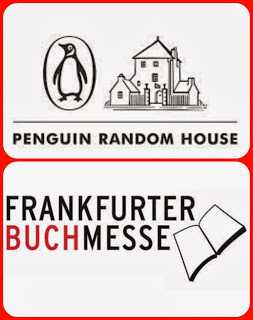
Is Big Publishing finally reacting to the digital revolution? Conventional wisdom has it that traditional publishers are pitted against Amazon and that self-publishing is so successful that publishers are rapidly becoming superfluous.
Markus Dohle, CEO of the biggest publishing house in the world, Penguin Random House, begs to differ. He has just told the Frankfurt Book Fair, the largest in the world, that:
1. cooperation with Amazon is essential: "Of course, we have to manage each other, on issues such as terms, but fundamentally, we are aligned."
2. self-publishing makes the role of publishers more important than ever: "people need orientation and guidance more than ever, and publishers can provide that."
Indeed, he sees "book discoverability" as the "the biggest challenge facing publishing", adding that a big publisher like Penguin Random House is "better placed on how to crack the code of discoverability, in a world where there are fewer bookstores".
I couldn't agree more and I have often blogged about how book discovery is the crux of the matter, especially in a world awash with self-published titles (see here, here and here). One major difference between a self-published author and a traditional publisher is that the former has no access to major literary journals and newspapers like the New York Times or major prizes like the Pulitzer Prize or Man Booker Prize, while the latter does, and how! The bigger the publishing house, the better...
What is your opinion? Is self-publishing for a writer who wants to reach his market really a working alternative to traditional publishing or is it just a mirage, fed by the personal pleasure of seeing one's book title on Amazon?
Related articles
 Self-Publishing Lab at Frankfurt Book Fair's CONTEC Event(goodereader.com)
Self-Publishing Lab at Frankfurt Book Fair's CONTEC Event(goodereader.com) Publishing start-ups crowd Frankfurt book fair(thelocal.de)
Publishing start-ups crowd Frankfurt book fair(thelocal.de) Frankfurt Book Fair proclaims "new era in international publishing"(teleread.com)
Frankfurt Book Fair proclaims "new era in international publishing"(teleread.com) World's Biggest Book Fair In Germany Targets Internet Giants(medindia.net)
World's Biggest Book Fair In Germany Targets Internet Giants(medindia.net)









Published on October 11, 2013 00:30
October 10, 2013
Nature vs. Nurture: Who Wins Out?

What is the influence of heredity compared to education and the environment?
This is a question that has haunted me for a long time, I even wrote three novels on the subject (The Phoenix Heritage, a series), often blogged about it and created a QuickQuiz on heredity that's been a huge success, thousands have played it (see here).
Recently my attention was drawn to a really cool video infographic that discusses the matter (to read the article, click here).
And here is the video, it concerns alcoholism in the US:
Guess what, those most liable to drink are those who are better off
(over $75,000/year income) and have more education (college degree and
above)!
That came as a real surprise to me.
This video of course does not solve the Nature vs. Nurture debate: it assigns an
equal percentage to hereditary factors and the environment. But some interesting questions are raised - important ones considering that alcoholism affects 1 in 12 adults in the US. By the way, that proportion is not significantly different in other countries where
drinking alcohol is part of the popular culture. And of course, we all
know that Russia has unfortunately the highest mortality attributable to
alcohol (for a comprehensive article on the global disaster caused by
alcohol, see here).
But all this does raise the question of what you can do about it when the problem is hereditary. And since alcoholism is not fully determined by hereditary factors, there is leeway to do something. Freedom of choice exists!
It's much like the image I used in Book One of the Phoenix Heritage series: in life, you are dealt a number of cards by Destiny, some of them the result of heredity, others added by education and experience. But how you play those cards is up to you!
This is where freedom of choice comes in. This is where your character, the sort of person you really are, can make a difference!
I find that idea very encouraging. How about you, what do you think?
Credit: This video is brought to you by Clarity Way Rehab.
Related articles
 I've just created a QuickQuiz - 5 Questions About Heredity(claudenougat.blogspot.com)
I've just created a QuickQuiz - 5 Questions About Heredity(claudenougat.blogspot.com) Nature vs. Nurture(apumila.wordpress.com)
Nature vs. Nurture(apumila.wordpress.com)









Published on October 10, 2013 06:03
October 9, 2013
A Scandalous Ad Campaign Takes Aim at Italy's Problems
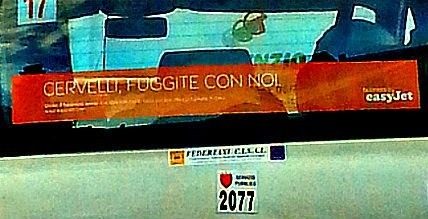
CERVELLI, FUGGITE CON NOI easyJet
That roughly translates as: "Brains (i.e. you the clever intellectuals, the trained experts), ESCAPE WITH US", the ad (photographed here on the back of a Roman taxi) is signed: easyJet.
Yes, escape from Italy, the country is in recession, it's a mess, get out of it!
How can EasyJet, a low-cost British airline carrier, dare do this?
Is the UK so much better off than Italy?
Okay, it's doing better than Italy right now but it certainly has problems of its own and is in no position to teach anything to anyone.
I am shocked.
True, Italy has been suffering from a serious brain drain for years and small wonder. If you're a young Italian and thinking of a start-up, everything goes against you, starting with the cost of the paperwork you must do with a notary public, € 3,000 plus a €2,500 deposit in a bank. Plus the tax on business which is one of the highest in the world, 45 percent. Plus the cost of social security and the fact that you can never fire anybody which means you think twice before you hire anybody. Plus the lack of investment in research and infrastructure, which is why eggheads go abroad to work in well-equipped labs.
I could go on and on. But honestly, to base an ad campaign on a country's deeply entrenched problems of brain drain? Not pretty.
Related articles
 Passengers look on in horror as easyJet flight leaves without them(metro.co.uk)
Passengers look on in horror as easyJet flight leaves without them(metro.co.uk) Italys' Brain Drain is UK's Brain Gain or How One Young Italian Made a Discovery that Could Help Fight Cancer(claudenougat.blogspot.com)
Italys' Brain Drain is UK's Brain Gain or How One Young Italian Made a Discovery that Could Help Fight Cancer(claudenougat.blogspot.com)









Published on October 09, 2013 01:23
October 8, 2013
Book Discovery Improved: A New Site to Discover Good Reads Instead of Cheap Deals

BookBub has been the incontested giant in book discovery and has gathered a huge following, over 1.5 million subscribers, in a matter of a few months. But there's a new cool site on the scene, a David to BookBub's Goliath.
It has an innovative business model that focuses more on getting in the reader's hands the books they want to read rather than bringing them books free or at a deep discount, as BookBub does.
Who's this bright new kid on the block? Aptly called The Fussy Librarian (click here to visit the site), it has now come of age since I last blogged about it a month ago (see here).
The Fussy Librarian started this summer by gathering info about readers' preferences, giving them the choice of 30 genres in fiction and non-fiction plus 10 content options identifying the level of sex and violence they are looking for (see their subscribe page here).

Then in September it opened up to authors to submit their books (see here)
Now, here's the clever part and where it differs from BookBub that concentrates only on the price of affirmed best sellers or books that have won critical appraisal in the main press and literary journals.
What the Fussy Librarian does is totally different. They want to unearth the good reads that have gotten buried under the tsunami of self-published books.
To do this, they've set up a different kind of barrier to entry for authors - if your book doesn't comply with these requirements, it won't be accepted. Here they are, in their own words:
10 reviews and a 4.0 rating on Amazon or Barnes and Noble or 20 reviews and a 3.5 rating.
A quality cover. In their own words: "We can’t stress this enough – it doesn’t matter
how brilliant your writing is if you have an amateur-looking cover".
A price of $5.99 or less.
This is very clever, because:
(a) they've maintainted the price range under control; the books on offer on their site will always be (relatively) cheap, BookBub beware!
(b) they aim for a quality read by focusing on three tell-tale signs: (1) number of reviews, (2) ratings and (3) a professional book cover. This is essential to help keep out the self-published, vanity "slushpile" that so much irritates readers and rightly so.
So far, 500 books were already submitted to them and they are about to start mailing recommendations to their subscribers. They are open for submission and the waiting period before recommendations are sent out is still short for certain genres because of the relative scarcity of submissions in those areas. This concerns, as of now: all
nonfiction,
action-adventure,
African-American,
children/middle
grade,
literary
fiction,
historical
fiction,
police
procedurals,
religious
fiction,
romance
erotic,
biography/memoir. So if you have written in those genres, hurry to submit your book! If, on the other hand, your book is romance, be prepared for a long wait before a recommendation is sent out: 96 days!
They have also shared their data on genre rankings based on what their readers have said they liked. In the top ten categories, you find:
Mysteries
Thrillers
Women's
fiction
Historical
fiction
Romance
contemporary
Literary fiction
Young adult
Fantasy/steampunk
Science fiction
Biography/memoir
That's interesting because it corresponds pretty well to the rankings on Amazon and in the market in general. This implies that they have managed to gather a respectable and representative mass of readers - in short, they are headed in the right direction.
Needless to say, I submitted my boomer novel, A Hook in the Sky (you can find it here on Amazon where it has now 28 reviews, but it's also available on all other e-book stores, including Apple, Barnes and Noble and Smashwords). And I certainly hope to find new readers thanks to the Fussy Librarian!
A closing comment:
Sites like The Fussy Librarian are still far away from book-discovery sites like the UK's Whichbook (see here) that rely on sophisticated reader-profiling tools and can count on a large revolving team of readers coming from UK libraries and literary journals and are willing to check on book quality ( currently, some 70 people). But although Whichbook has developed an original tool for book research on the basis of many criteria, it is not a commercial marketing tool as such and does not contact you on your email box with recommendations.
What a pity that the two systems can't come closer together! What's your opinion as a reader or writer or both?
Related articles
 What's the 411 on The Fussy Librarian?(authorshelpingauthors.wordpress.com)
What's the 411 on The Fussy Librarian?(authorshelpingauthors.wordpress.com) On Reading: Should Academic Librarians Be Doing Reader's Advisory?(rulenumberoneblog.com)
On Reading: Should Academic Librarians Be Doing Reader's Advisory?(rulenumberoneblog.com) Reading literary fiction improves 'mind-reading' skills(psypost.org)
Reading literary fiction improves 'mind-reading' skills(psypost.org) Be fussy!(talesfromanopenbook.wordpress.com)
Be fussy!(talesfromanopenbook.wordpress.com)









Published on October 08, 2013 02:38
October 7, 2013
Passionate for Peace: Fashion Show in South Sudan
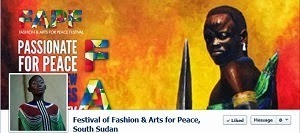 South Sudan is a country that was born two years ago out of a wrenching civil war with the North. The country has a name, a flag, a national anthem but little more. Its capital, Juba, though it is growing fast with oil money, still has few paved roads and little proper housing. The country needs to be built from the ground up - everything from housing to culture.
South Sudan is a country that was born two years ago out of a wrenching civil war with the North. The country has a name, a flag, a national anthem but little more. Its capital, Juba, though it is growing fast with oil money, still has few paved roads and little proper housing. The country needs to be built from the ground up - everything from housing to culture. In this harsh and demanding setting, the unexpected happens: a young South Sudan designer, Akuja de Garang, determined to change the image of South Sudan as a war-torn country, has organized two years in a row a fashion festival in Juba with the support of the United Nations mission in South Sudan (UNMISS).
The most recent edition held on UN International Youth Day (13 August 2013) attracted the attention of major international media, including the New York Times (click here) and Elle South Africa (click here).
Akuja de Garang is a lively woman, she has worked for UNICEF and has started a year ago a clothing line, called Akuch, which means "mystery" in the Dinka language. Here she is at home:

(photo by Christina Reynolds, Elle Canada, click here for article on de Garang)
And here are some of the models that were shown this year - this one is getting ready to step on the catwalk:

And here are others in de Garang's signature clothes:
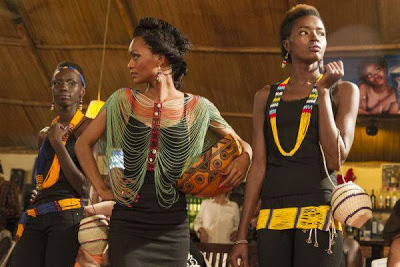
To visit the Fashion Show's Facebook page: click here, many more photos there.
Or to get an idea of the South Sudanese fashion scene, watch this video done a year ago (but not by de Garang):
Great music and it proves that fashion in South Sudan is spreading!
Surprised? I know I was, I didn't expect this from a country coming out of decades of civil war. I find this very encouraging, a positive expression of the human spirit and the love of beauty, a great way to change the image of Sudan and showcase creativity...Don't you agree?
Related articles
 South Sudan Promotes Local Creatives(bet.com)
South Sudan Promotes Local Creatives(bet.com) Rome Wasn't Built in a Day(fredayinafrica.wordpress.com)
Rome Wasn't Built in a Day(fredayinafrica.wordpress.com)









Published on October 07, 2013 00:20
October 3, 2013
How Do You Write? Pantsing vs. Plotting

Are you the sort who plans the book with a full outline down to the last detail or are you like my fellow writer Robert Chazz Chute, who knows what the characters are in his book and where they will end up but has no idea how they will get there?
I came across this cool video where he explains it all.
I found that he describes exactly my own creative process, amazing! I could have done the same podcast (except at the end of course, I would have promoted my own books, grin).
The key to it?
It's fun to write as long as you don't know each step of the way, that's
what keeps the interest up and alive for you as a writer...and
presumably for your readers too!
Listen to Robert:
I've always been convinced of that: if I'm bored with my writing, you, the reader, will be too! I promise you, every boring piece of writing I've ever done has always ended in the waste-paper basket. Deleted!
This is the writer's dilemma: to outline or not to outline. If you're a writer, share with us how you do it in the comments, tell us what works for you and why. Or vote in the poll and find out how others do it:
How do you write your book?
I'm a plotter - following a full outline chapter by chapter to the last detail
I'm half a plotter - a general outline with main plot points, characters and final scene
I'm a pantser - no outline, only main characters and main plot points
pollcode.com free polls
(Photo credit: The School of Athens, detail from fresco in Stanza della Segnatura, Vatican - Wikipedia)
Related articles
 NaNoWriMo: Planning vs. Pantsing(vickystewartwrites.wordpress.com)
NaNoWriMo: Planning vs. Pantsing(vickystewartwrites.wordpress.com) Plotter v Pantser: the battle within(belindawilliamsbooks.com)
Plotter v Pantser: the battle within(belindawilliamsbooks.com) Finding my way through the outline(burgesstaylor7911.wordpress.com)
Finding my way through the outline(burgesstaylor7911.wordpress.com)









Published on October 03, 2013 23:04



